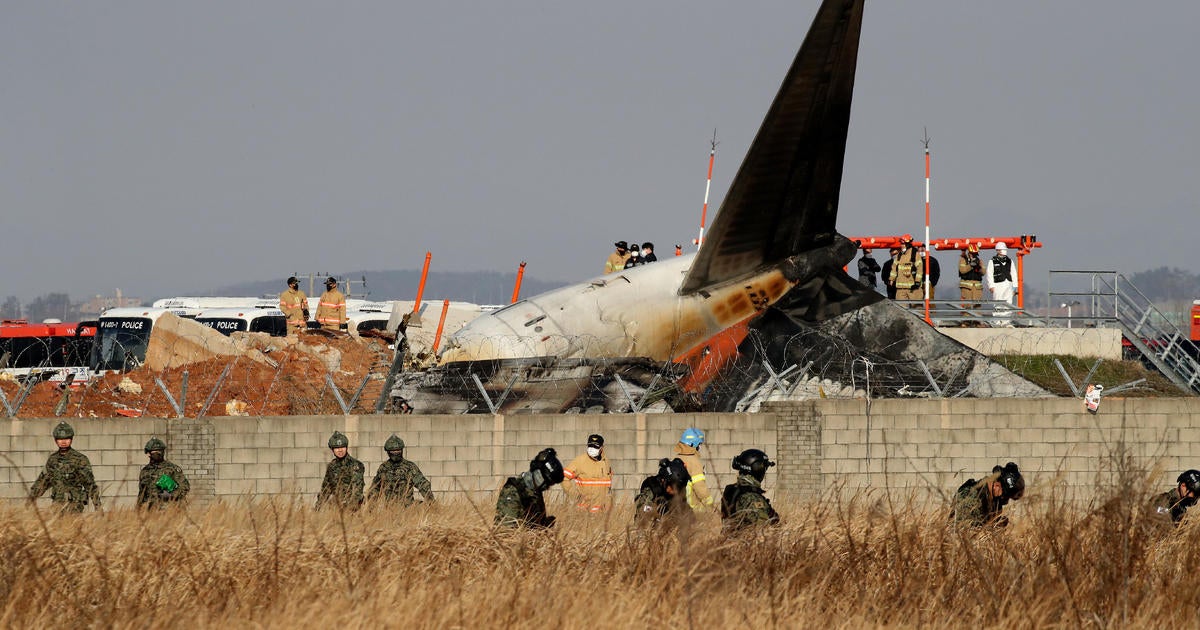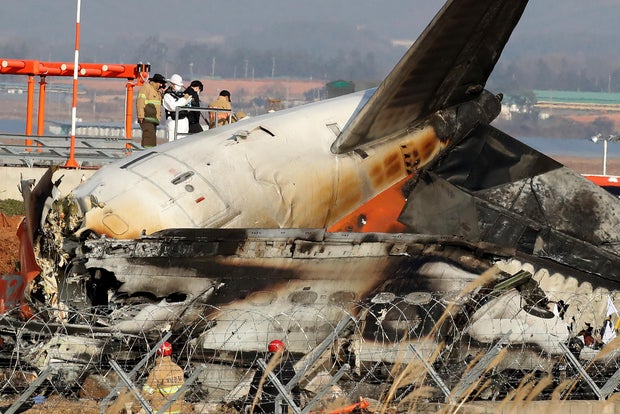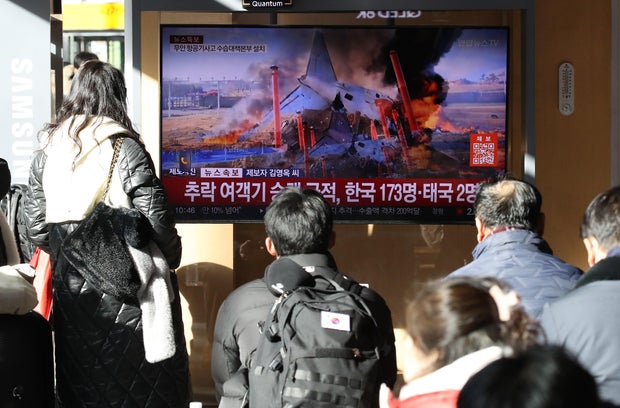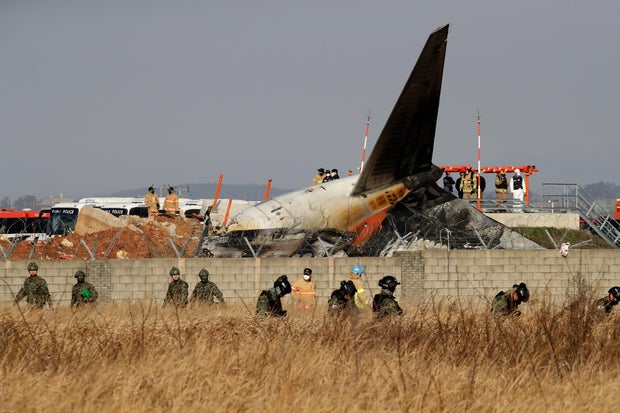
The investigation into the South Korean plane crash raises more questions than answers about the cause
South Korean officials have vowed to find out what caused it A Boeing 737-800 passenger plane operated by Jeju Air caught fire while attempting to land over the weekend. all but two of the 181 people on board were killed. A day after the crash, there were still more questions than answers about the country's worst aviation disaster in decades.
After the crash, authorities ordered an immediate inspection of all 737-800 planes operated by the country's airlines, a total of dozens of planes, but there are still no clear indications of whether there was a system malfunction, human error or a combination of factors. caused a disaster.
Here's what is known about the Jeju Air crash, and some key questions raised by the tragedy.
What happened when the South Korean plane crashed?
Jeju Air Flight 7C 2216 departed from Bangkok, Thailand and approached its scheduled landing at Muan International Airport in South Korea on Sunday.
After an initial unsuccessful landing attempt, the Boeing 737-800 received a bird strike warning from ground control and then took off again before attempting a second landing.
Two minutes later, the plane's crew sent a distress signal and attempted to land on another runway.The plane landed three minutes later without lowering the nose landing gear.
It skidded along the runway at high speed, exited the end of the runway and crashed into a concrete barrier, exploding in a fireball.The only survivors were the two crew members who escaped from the tail.
Chung Sung-Jun / Getty Images
Observers said videos of the crash suggested the plane was suffering from suspected engine trouble, but a malfunctioning landing gear was likely the main cause of the crash.
South Korea's transport ministry said the plane's flight data and cockpit voice recorders, so-called “black boxes”, were transferred to a research center at Seoul's Gimpo International Airport for analysis, the ministry said earlier, to complete the crash investigation it will take months.
“I think the cockpit voice recorder, if they can read it, will be the key to unlocking this mystery,” Robert Sumwalt, former chairman of the US National Transportation Safety Board, told CBS News.
Getty Images:
Jeju Air said the crash was not caused by “any maintenance issues,” according to South Korean news agency Yonhap and aviation expert Jeffrey Thomas. said BBC News that South Korean airlines are generally considered to follow “industry best practices” and that the plane and Jeju Air have an “excellent safety record.”
The South Korean plane slid into the fence that protects the antennas
Transportation Department officials said Monday they will examine whether the plane's crash barrier (a concrete structure that contained a series of antennas designed to guide planes safely during landing) should have been made of lighter materials that would have broken more easily on impact. They said they were also trying to determine if there were any communication problems between air traffic controllers and the pilot.
The placement of localizing antennas behind unforgiving mounts near the end of the runway will likely be the focus of investigators..
Chung Sung-Jun/Getty Images
“Normally, at an airport with a runway at the end, you don't have a wall,” flight safety expert and German Lufthansa pilot Christian Beckert told Reuters news agency letting the plane sink into the ground a little” to slow it down.
Could a bird strike have caused the Jeju Air disaster?
Lee Jeong-hyun, chief of the local Muan Fire Department, said Sunday that a bird strike and bad weather may have contributed to the accident, but he stressed that the cause was still under investigation.
According to CBS News partner BBC News, a passenger on the flight texted a relative before the disaster to say the bird was “stuck in the wing” and that it could not land, but officials have not yet confirmed whether there was any one: bird strike.
Geoffrey Thomas, an expert quoted by the BBC and editor of Airline News, told Reuters separately that he was skeptical that a bird strike alone could have caused the fatal crash.
“Bird strikes are not unusual. Frame problems are not unusual. Bird strikes are much more common, but they are not usually the cause of the loss of the aircraft,” he said.
Why didn't the lander launch?
It remained unclear if there was any engine or systems failure by the flight crew during the last few minutes of the ill-fated flight. helped slow the plane, suggesting there may have been a loss of hydraulic pressure that operated the mechanicals.
The hydraulic control systems operate independently, and experts say that an engine problem is unlikely to affect their performance.
The plane also has a mechanical barrier for the pilots to lower the landing gear in the event of an electronic or mechanical failure. It was unclear whether the Jeju Air crew simply did not have time to manually lower the nose wheels or some other factor could have prevented them from doing so.
Sumwalt, former chairman of the NTSB, told CBS News. “I've flown 737s for 10 years as a captain and I can tell you that the landing gear can be manually deployed, so the real question will be what caused the sequence of events here. Did the bird strike set up the sequence of events where the crew rushed and failed to deploy the landing gear due to a gear malfunction, given that it could have been deployed manually and by conventional means?'
A long, tough year for US aviation giant Boeing
The crash capped a troubled 2024 for struggling US aviation giant Boeing security issuesa the drivers are on strike and: falling stock prices.
Experts say the 737-800 is a more proven model than the company's much-maligned 737 Max jets. linked to fatal crashes in 2018 and 2019.
“I think it's very important to separate this accident … from the problems that Boeing has had in the recent past,” Sumwalt said the plane is so old and has flown thousands of hours since this one.'
However, South Korean authorities have said they will conduct safety checks on all 737-800s operated by domestic airlines, including Jeju Air's 39.
contributed to this report.



